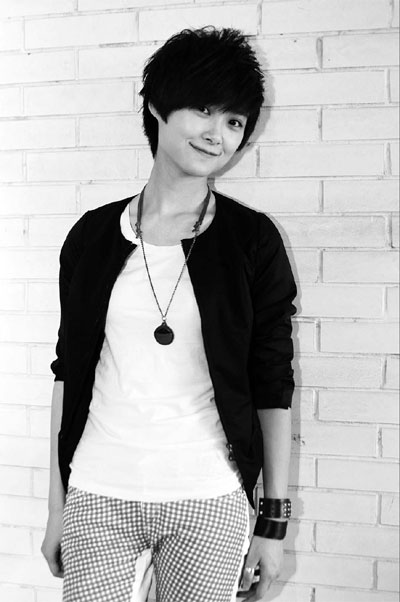Super Girl slows down
|
Li Yuchun says she wants the next six years to be about who she really is. Feng Yongbin / China Daily |
The star of 2005, Li Yuchun, gets reflective in her new album, which she says is less about her and more about others. Chen Nan reports.
It is mid-afternoon, and shortly before Li Yuchun is due for a performance at the Great Hall of the People, she arrives at her agent's company to get dressed. Once ready, she looks out of the window of the high-rise building, located in the capital's CBD area, and jokes with her assistant: "The traffic jam has started. I hope my make-up won't disappear by the time we get there."
As she walks from one room to another, passing a huge poster of her latest album in the corridor, she laughs unselfconsciously and says, pointing to it: "I look thinner now, right?"
Unlike the poster, which shows Li in an elegant white blouse and white jeans, in person, the 27-year-old singer cuts a simple figure in a pair of skinny plaid pants, a white T-shirt under a black blazer, and a pair of white sneakers.
"I feel much more comfortable in these clothes. Being without makeup would be even better," she laughs.
"My favorite pictures are those taken during my trip to London last year. They are very natural and casual. The trip was just for fun, and I went with my family, (so there was) no pressure, no makeup and no work."
She not only got to spend time with her family but also had the opportunity to reflect on the past six years, since winning the top spot in the wildly successful nationwide singing competition, Super Girl, in 2005.
The contest attracted a nationwide audience of 400 million, the largest in the history of Chinese television.
Her instant fame created a Li Yuchun phenomenon with youngsters imitating her tomboy image and contestants copying her singing style. She also triggered a donation craze after she was chosen ambassador of the Li Yuchun Fans Charity Fund in 2006, the first such fund to be named after a celebrity in China.
At the age of 21, she appeared on the cover of the Time Asia Magazine and was selected as one of its Asian heroes.
The singer, now an icon in the world of Chinese pop music, has come a long way.
"Five years ago, I didn't even know why I should receive an interview or how to answer questions," she says, sitting in a corner of a large red sofa.
Recalling the days of the competition that capitulated her to fame, her lips tighten and she suddenly turns serious.
"I was so tired," she says.
"As I competed in round after round, all I thought about was being the best. And when I finally won, I just felt empty," she says. "With everybody watching my every move, I wanted desperately to prove myself."
Since her win, the Sichuan native and music conservatory graduate, has set a punishing pace for herself, releasing one album a year and holding concerts around the country.
Her first album in 2006, The Queen and the Dreams, sold more than 400,000 copies in one month. The second (Mine), third (Youth of China) and fourth (Chris Lee) all sold well and strengthened her position as one of the most popular female singers in China's pop music industry.
"I sang about myself in these albums. Although the songs were written by others, they were all about 'my kingdom, my stage, my world' ," Li says, referring to some of the lyrics of her songs. "But now I want to reach out to others as I am not that self-centered anymore. I hope listeners will be able to relate to my songs."
Li says she slowed down in 2010, to be with her family and childhood friends.
"I used to be a workaholic. Even if I didn't have work to do, I would give myself extra tasks, such as learning movie editing, music production and computer software. But now, I look forward to taking a vacation, hanging out with friends and resting at home," she says.
These changes are reflected in the new album, Hui Tiao Wu De Wenyi Qingnian (Art Youth Who Can Dance), where nearly all the songs are written and composed by Li. Wenyi qingnian refers to young people who love literature and art, and are generally quiet, knowledgeable and low-key.
"Those referred to as wenyi qingnian are taken for granted to have a certain personality. But I don't agree with this. While I am quiet off stage, I also love to dance," she says. "I want to break the stereotype (of wenyi qingnian).
"I want the next six years to be about who I really am."
(China Daily 07/23/2011 page11)















